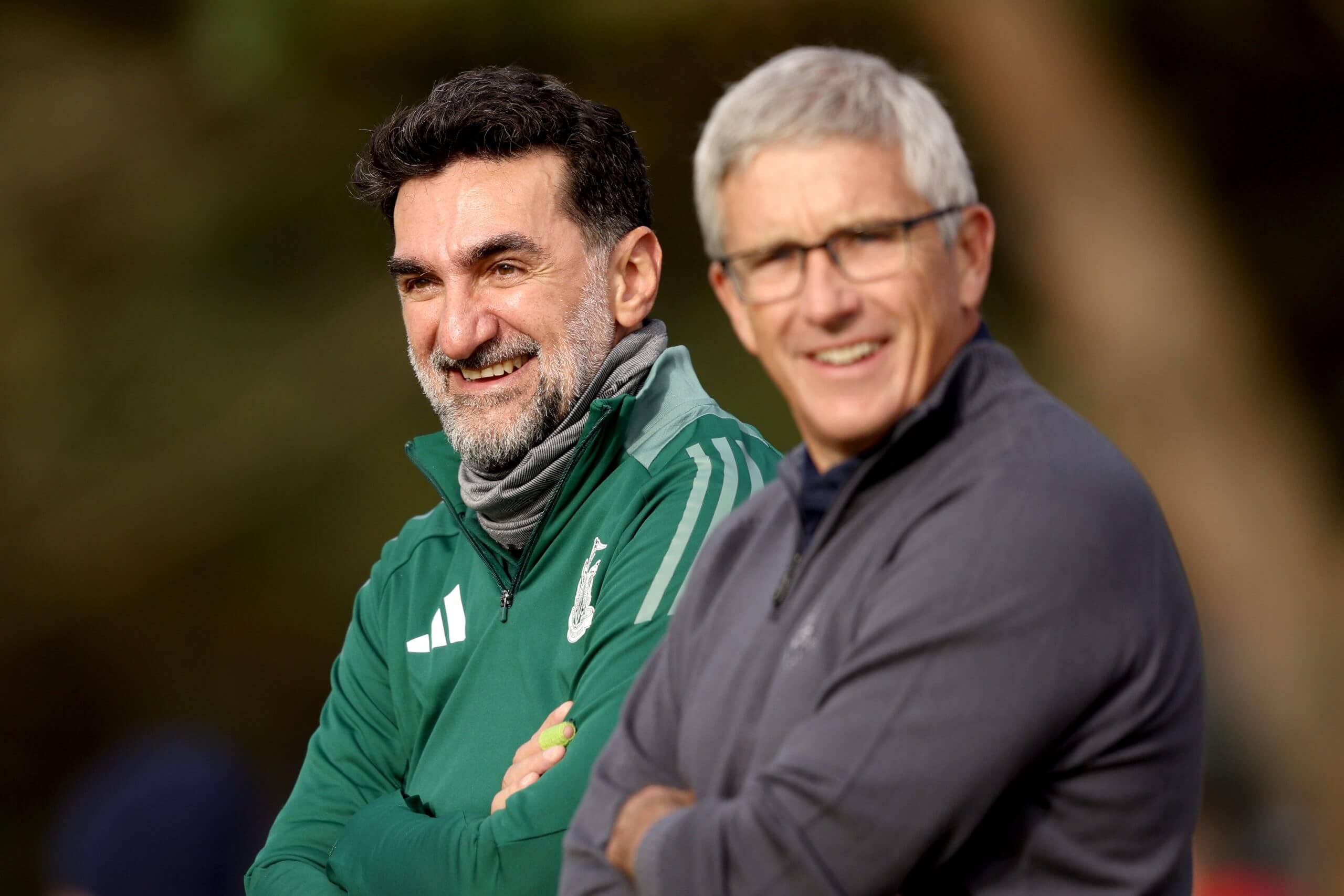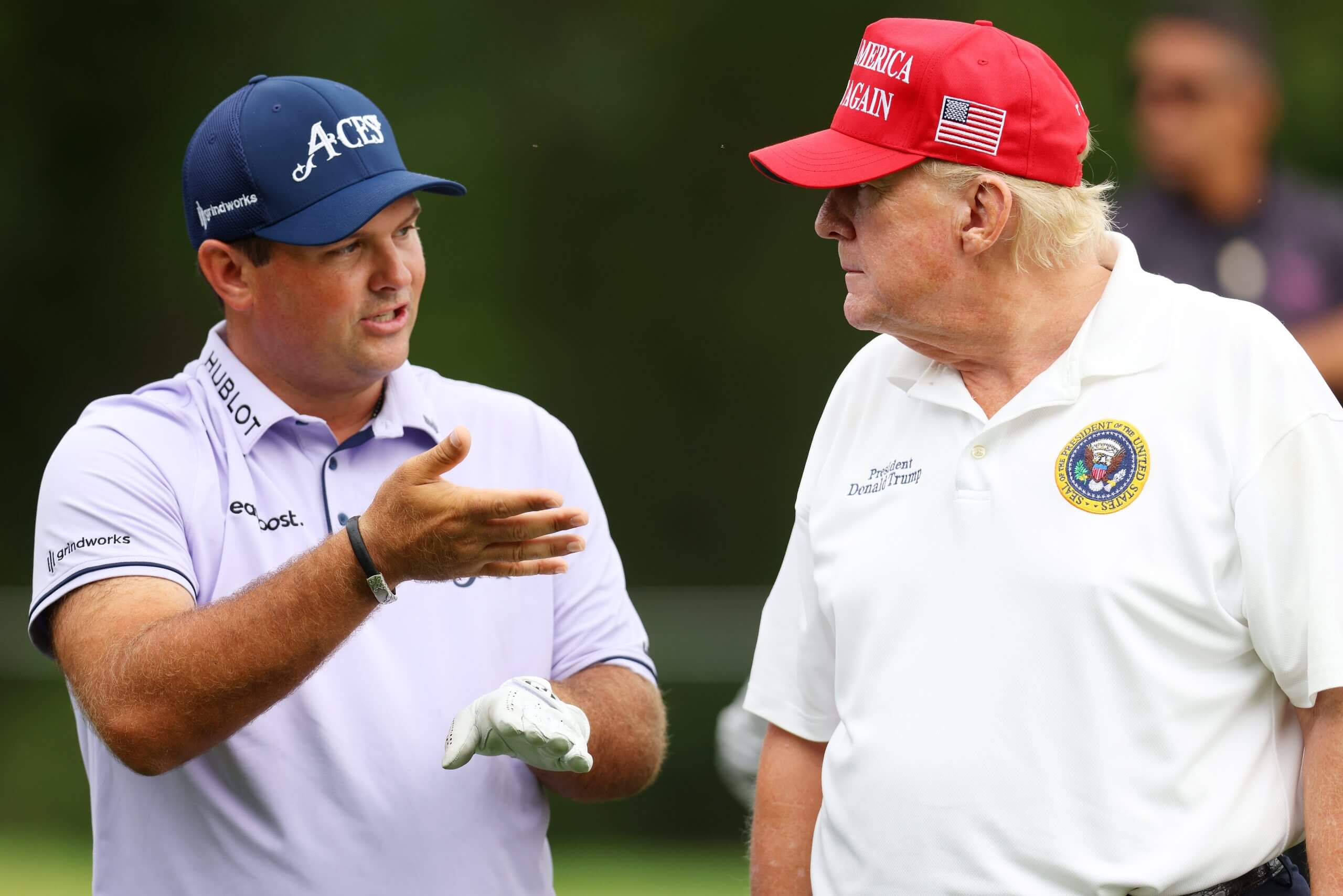
The outcome of the 2024 presidential election could have significant implications for the future of men’s professional golf.
The administrations of Vice President Kamala Harris and former President Donald Trump are likely to respond differently to an executed agreement between the PGA Tour, Saudi Arabia’s Public Investment Fund and the DP World Tour, several legal experts familiar with these types of cases and the U.S. Department of Justice’s antitrust review process told The Athletic.
On June 6, 2023, PGA Tour Commissioner Jay Monahan and PIF Governor Yasir Al-Rumayyan announced a framework agreement, putting a stop to the costly and divisive litigation between LIV Golf and the PGA Tour. They outlined an intention to “reunify the world of men’s professional golf” under a new for-profit LLC, with the Saudi sovereign wealth fund injecting more than $1 billion and the tour maintaining control. Since that announcement, the parties have continued to negotiate toward a finalized deal. In recent months, however, that process has been occurring behind closed doors, without a timeline on the horizon.
Experts say that Monahan’s initial comments surrounding the agreement alarmed the antitrust community. During a CNBC interview, the commissioner stated that the PGA Tour-LIV Golf deal would “take the competitor off the board” — signaling a goal of limiting competition and reclaiming control of the industry. Language preventing the leagues from poaching talent was included and then dropped after it raised immediate concerns from antitrust officials, due to its clear intention to stifle opportunities for the golfers, who are considered independent contractors. Those red flags raised by the DOJ around the deal have not disappeared.
“The DOJ is a creature of the executive branch, and with its law enforcement and prosecutorial role, it can exercise significant discretion and pursue the priorities of the current administration,” said Brooklyn Law School professor and sports antitrust expert Jodi Balsam. “When a new administration comes in, whether it’s Harris or Trump, they can dictate the priorities of the DOJ.”
Neither the Trump nor the Harris campaign responded to messages seeking comment from The Athletic, and neither candidate has made the future of professional golf a significant issue on the campaign trail. Still, the sport is preparing for either outcome given the power of the presidency and the unusual circumstances of Trump having a personal financial interest in the completion of the deal.
Trump has expressed support in the past for its approval. And before the framework agreement, he urged golfers to “take the money” from LIV Golf because they would “get nothing after the merger takes place.”
When the deal was announced, Trump shared on Truth Social in capital letters: “Great news from LIV Golf. A big, beautiful, and glamorous deal for the wonderful world of golf.”

PIF governor Yasir Al-Rumayyan and PGA Tour commissioner Jay Monahan played golf together last month, something unthinkable 18 months ago. (Warren Little / Getty Images)
“I think the chances of the merger going through increase quite a bit under a Trump administration,” said Amanda G. Lewis, a partner at Cuneo Gilbert & LaDuca, formerly an FTC attorney responsible for investigating and challenging anticompetitive mergers.
LIV Golf has hosted six events in its three-year history at Trump’s courses in New Jersey, Virginia and Miami, paying the Bedminster and Doral courses for the privilege, and his son-in-law, Jared Kushner, has received a reported $2 billion investment into his private equity firm from the PIF, LIV’s backer. Beyond the Trump family’s relationship with the Saudis and his enthusiasm for LIV Golf (he has attended multiple times), the former President has never been particularly respectful of anticompetitive regulations. As the owner of the New Jersey Generals, once part of the shuttered United States Football League, Trump manufactured an antitrust lawsuit against the NFL that ultimately led to the start-up league’s demise.
“The antitrust laws are a weapon (to Trump), a thing that you use to create a merger that would be a monopoly,” said a prominent sports antitrust lawyer, who spoke on condition of anonymity because they had been previously involved with PGA Tour legal matters. “He’s all about trying to use these sorts of processes.”
Experts anticipate that the Harris administration, on the other hand, will remain in line with the Biden administration’s prosecutorial priorities. One key case in the publishing industry, they said, showed that the DOJ under Biden was hesitant to reduce competition for workers in their industries. The professional golfers impacted by this deal are well-compensated but would still fall under this umbrella.
Biden’s DOJ successfully blocked Penguin Random House’s proposed purchase of Simon & Schuster in 2022. If allowed to go through, the country’s largest publisher would have grown substantially, resulting in fewer total publishers to make deals with authors, and therefore fewer competing buyers for the authors’ labor. Experts consider this a strong parallel to PGA Tour-PIF, where two bodies which were previously competing for players intend to reside under the same LLC (PGA Tour Enterprises).
“I don’t think the DOJ is going to be OK with these two combining,” Lewis said. “And instead of competing against each other for the labor of these golfers, now they’re going to be in cahoots and acting like one entity.”
The likelihood of a difference in stance between the Harris and Trump administrations doesn’t necessarily mean the deal would reach completion under one administration and fall apart under the other. Depending on the priorities and stance of the DOJ, the deal can be reshaped to meet compliance.
“Regardless of how they move the partnership forward, they may want to time it around the election if they think they’ll be treated more favorably by a new administration,” Balsam said. “There may be reason to delay seeking the DOJ’s blessing because they are waiting to see what election day will bring.”
But it is also historically difficult to “turn the Titanic” and work against the previous administration’s antitrust priorities, Balsam said. DOJ staff members will stay put and regulations surrounding internal processes, for example, will be difficult to change from administration to administration. The DOJ declined to comment for this story.
Presidents cannot order that a merger be deemed illegal — that, as in the Penguin Random House case, is up to the courts to decide. Administrations can, however, influence the decision to challenge a merger in the first place. The presidential power is asymmetrical in this respect, says Cornell University antitrust professor and former DOJ attorney, George Alan Hay.
“Very few cases in our history have been influenced by a president’s thoughts,” Hay said. “(Trump) would be a different president than most.”

Trump has played in LIV Golf pro-ams with Patrick Reed, left, and others. (Mike Stobe / Getty Images)
What’s next
The next indicator that golf’s civil war is over is unlikely to be a second joint CNBC interview for Monahan and Al-Rumayyan. It’ll instead be both parties managing a complicated red tape process that could already be underway.
The PGA Tour, the PIF and the DP World Tour can begin engaging with the DOJ before terms are reached for a “definitive agreement.” But once an agreement is submitted, the U.S. Department of Justice will begin its formal regulatory review process to determine if there are antitrust violations associated with the deal. Regardless of who is the winner after Nov. 5, the involved parties will likely be aware of the election’s potential impacts on the DOJ’s proceedings.
The agreement will, according to experts, likely require a filing under the Hart Scott Rodino Act (HSR). The HSR Act mandates that companies file pre-merger notifications with the DOJ or the Federal Trade Commission (FTC), depending on the industry. The DOJ is specifically handling the review, according to an initial report by the Wall Street Journal and affirmed by Adam Scott and Rory McIlroy, PGA Tour pros and members of the tour’s Transaction Subcommittee.
“It’s possible (a deal) doesn’t happen. I mean, it will ultimately be up to the Department of Justice to kind of guide that,” Scott said last month.
There are several tests to determine whether a merger or joint venture will require HSR, including the size of the transaction. The estimated size of the transaction in this case well exceeds the threshold for filings of this nature.
“An HSR filing is likely necessary here,” said Balsam. “The 2024 threshold for requiring a filing is whether the transaction is valued at at least $478 million. The number being thrown around as to the value of the Saudi PIF proposed investment in the PGA Tour is at least $1.5 billion.”
“It may depend on the exact arrangement they come to, but I would expect that anything resembling a full merger would require HSR,” Hay said. “But it won’t matter much, since it will be a very public happening and the agencies will investigate anyway.”
Even if the parties structure or label the deal as an investment, joint venture or partnership and insist that it is not a merger — as Monahan did emphatically in a letter to lawmakers after the announcement of the framework agreement — the regulators still have the power to investigate antitrust violations. Saudia Arabia’s human rights record adds to the complexity of the deal — multiple members of Congress have gone on record with their concerns.
“Not only does it not matter what you call it, if there is a deal in which there are participants in the same industry that are acquiring or selling an asset of a certain value, it’s strictly a numbers game. There is a certain threshold and if you exceed it, you have to make a Hart-Scott-Rodino filing,” Balsam said.
The DOJ has no obligation to publicly disclose its review process. This is perhaps why there have been minimal updates on the negotiations, despite public optimism from leaders amongst the parties. Earlier this month, Monahan and Al-Rumayyan were grouped together at the Alfred Dunhill Links Pro-Am in Scotland. The PGA Tour also granted releases for McIlroy and world No. 1 Scottie Scheffler to play in an exhibition-style match against LIV Golf’s Bryson DeChambeau and Brooks Koepka on Dec. 17.
After an HSR filing is submitted, the DOJ has 30 days to review the base level of information provided about the terms of the agreement and its contours. After those 30 days, the parties are either allowed to go public with their deal, or the DOJ issues a “second request,” which experts anticipate in this case, and that could take months. In the second request stage, all three parties will be subject to discovery — a process that the Saudis and the PGA Tour both initially sought to avoid, the former claiming and then failing to achieve sovereign immunity. There is reason to question why the PIF would go forward with a deal with the PGA Tour if its leading officials knew that the discovery hurdle would reemerge.
Regardless of the parties’ willingness to comply, the DOJ’s review process — whichever form it ultimately takes in the case of PGA Tour-LIV — is not one to dismiss as a simple step in completing a deal. It is an extensive process subject to the priorities of the department.
(Illustration: Meech Robinson / The Athletic; Photos: Megan Varner, Win McNamee / Getty Images and Ben Jared / PGA Tour via Getty Images)